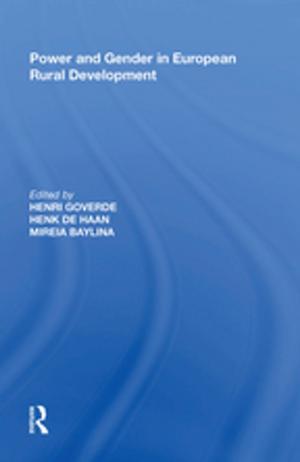| Author: | Mokbul Morshed Ahmad | ISBN: | 9781351763493 |
| Publisher: | Taylor and Francis | Publication: | November 22, 2017 |
| Imprint: | Routledge | Language: | English |
| Author: | Mokbul Morshed Ahmad |
| ISBN: | 9781351763493 |
| Publisher: | Taylor and Francis |
| Publication: | November 22, 2017 |
| Imprint: | Routledge |
| Language: | English |
This title was first published in 2002. NGOs are receiving increasing international attention and resources from policy makers, donors, academics and others. The New Policy Agenda accepts NGOs as agents for social welfare alongside the state and as fostering democracy in the Developing World. Astonishingly, however, there have been very few studies and no books on NGO field workers. This study of field workers in Bangladesh, provides excellent insights into this neglected field. Bangladesh is an excellent example as, since independence in 1971, it has been a 'donor-dependent' country, both financially and functionally, and since the 1980s has concentrated this funding towards NGOs rather than to the state. The book shows how field workers are seen simply as implementers, carrying out directions given by their superiors and never being consulted on how best to achieve their goals. The book examines four types of NGOs - international, national, regional and small/local - in a number of sample locations. It compares the benefits and facilities provided by each NGO to their field workers, then explores the socio-economic background of both field workers and their mid-level managers and examines the interactions between these two groups and between field workers and their clients. It also looks at the field workers’ personal and professional lives and problems and details their opinions on their NGO’s activities and policies and on development. The findings show that NGO managers and donors lack knowledge of the realities in the field and do not realise how certain policies, such as their positive discrimination of women, can have negative results. It proposes that NGO field workers should be more active in policy making and puts forward several recommendations for changes in the management and structure of future NGOs.
This title was first published in 2002. NGOs are receiving increasing international attention and resources from policy makers, donors, academics and others. The New Policy Agenda accepts NGOs as agents for social welfare alongside the state and as fostering democracy in the Developing World. Astonishingly, however, there have been very few studies and no books on NGO field workers. This study of field workers in Bangladesh, provides excellent insights into this neglected field. Bangladesh is an excellent example as, since independence in 1971, it has been a 'donor-dependent' country, both financially and functionally, and since the 1980s has concentrated this funding towards NGOs rather than to the state. The book shows how field workers are seen simply as implementers, carrying out directions given by their superiors and never being consulted on how best to achieve their goals. The book examines four types of NGOs - international, national, regional and small/local - in a number of sample locations. It compares the benefits and facilities provided by each NGO to their field workers, then explores the socio-economic background of both field workers and their mid-level managers and examines the interactions between these two groups and between field workers and their clients. It also looks at the field workers’ personal and professional lives and problems and details their opinions on their NGO’s activities and policies and on development. The findings show that NGO managers and donors lack knowledge of the realities in the field and do not realise how certain policies, such as their positive discrimination of women, can have negative results. It proposes that NGO field workers should be more active in policy making and puts forward several recommendations for changes in the management and structure of future NGOs.















